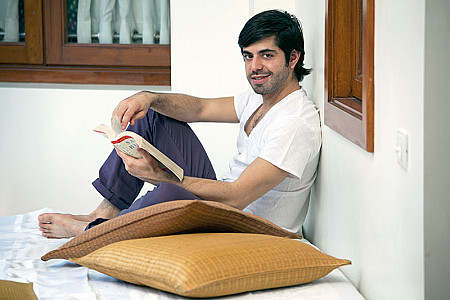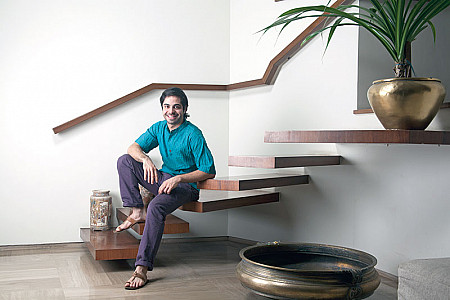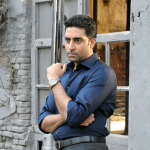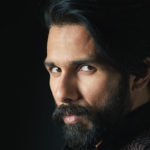A Tryst With ‘Midnight’s Child’
As a pre-schooler he crossed out the word ‘want’ on a worksheet handed to him, which said: “When I grow up I want to be a….” Instead, three-year-old Satya Bhabha firmly scrawled ‘am going’ to replace the slashed word. “When I grow up I am going to be an actor” he printed indelibly, with a decisiveness belying those toddler years.
So he has. At 29, theatre and film actor, director and musician Satya Bhabha is poised to capture the minds and hearts of an eager audience with his much-anticipated big screen appearance. A coveted role, for which several contenders were in the running, including baby-face Imran Khan, was suddenly his with sass and serendipity. If Salman Rushdie confessed surprise at the global – and by now eternal – hurrah for his opus which Jonathan Cape publishers once clearly dismissed, 30 years later a very startled young Satya Bhabha realised he’d snagged its cinematic hero’s role just as unexpectedly.
The novel famously birthed after an exploratory 1975 journey of 15-hour bus rides and humble hostelries in India, exhausted the author’s few hundred pounds’ advance on his first novel Grimus. Cut to young Satya listening to actress Ellen Bernstein’s Q&A with Deepa Mehta at a New York show of Heaven on Earth. He all but fell off his back row seat when the director pointed out, “And there’s the young man who will be Saleem in my next movie.” An auditorium worth of heads swivelled to stare at the hooded figure. “Scrunched under my jacket, I sat bolt upright. The news was unreal!” he grins in heady recollection. “That’s Deepa for you, relying on her instinctive feel of a person. She speaks and films with total spontaneity.”
Not dreaming he would play what must surely reign among Indo-English fiction’s most challenging protagonists, Satya met Mehta in Toronto a couple of years back. There was casual chat of Mumbai, followed by a brief recording of audio and video material he thought no more about. Yet, he emerged the choice of both Mehta and Rushdie who has done the screenplay adaptation of his own tour de force. Getting the then 27-year-old to portray Saleem, aged 16 to 30, the Booker-feted writer pronounced they hit on ‘the perfect blend of gravity and gumption’.
Satya, in turn, says, “I don’t know if anyone except for Salman could take liberties with the text, in the interests of clarity, transforming it into this amazing cinematic piece. As for Deepa, watching her work is fascinating. Her awareness of human truth is a gift to actors. She searches the canvas in delicate detail for veracity of textured emotions.”
Where we sit in the gracious ancestral Cuffe Parade home he visits for the wedding of his cousin, daughter of an uncle actually referred to in Midnight’s Children (industrialist Cyrus Guzder is Cyrus the Great), offers instant throwback to a lineage ensuring London-born Satya firmly belongs to the arts. Here a fortnight ago, his father Dr Homi Bhabha, director of the Humanities Center at Harvard University, received word of being awarded the Padma Bhushan. The actor son speaks of his Jewish mother Jacqueline, an attorney and lecturer on human rights – who grew up in Mumbai for ten years – devoting long weekends to her three children’s music practice. Satya picked up the cello at all of three summers old, a skill he still showcases with the band He’s My Brother She’s My Sister. “My passion for the performance arts has definitely been the result of strong family influences. Once, when I was really little, doing something like buying strings for my cello or rosin for its bow, my mother put a cassette of Fred Astaire’s music in my hand. She told me it was my grandmother’s favourite listening. I was hooked by what I heard.”
Annual summer holidays in this city were crowded with swims at the Breach Candy pool and protecting potato chips from crows circling the Willingdon Club lawn. The more serious connect to real Mumbai, thanks to this plum part, is a chance he has bitten into with relish. “Midnight’s Children is a big rites-of-passage book for my family, with its freewheeling world to fall into, the myths deeply ingrained.” To meaningfully soak in Saleem’s milieu, Mehta encouraged her lead actor to devour everything from Nehru’s Discovery of India and Ramachandra Guha’s India after Gandhi to Dominique Lapierre’s Freedom at Midnight and Suketu Mehta’s Maximum City. Learning Hindi, he took himself on a contextually authentic recce for six weeks, ‘trying to be more Mumbaikar’, armed with Rushdie’s engrossing accounts of Dhobi Ghat and fishing shanties balancing descriptions of Malabar Hill and Warden Road.
Shot in Sri Lanka on a February to May 2011 start-to-finish schedule, Mehta’s mega movie releases this year. Mumbai was nixed as rampant congestion has left few spaces looking free enough to suggest locations capturing the postcolonial 1940s-to-1970s period. How the vast sweep of defining Partition-till-Emergency politics, life-changing magic and high-voltage antics of magnificently larger-than-life characters peopling Rushdie’s bold narrative will unfold, makes this a most anticipated production. Apart from a powerhouse ensemble cast (Darsheel Safary, Shabana Azmi, Soha Ali Khan, Siddharth, Seema Biswas, Shriya Saran, Rajat Kapoor, Kulbhushan Kharbanda, Shahana Goswami, Shikha Talsania, Ronit Roy, Anita Majumdar and Sarita Chowdhury), the telekinetic powers shared between the special Midnight’s Children are rendered wonderfully nuanced. “No fear of X Men stuff there,” promises Satya. Speaking of the project’s remarkable crew and make-up team too, he reveals that the hero’s enormous trademark ‘cucumber’ nose, superbly designed by prosthetics experts, took well over an hour to fix daily.
This enigmatic role comes in the wake of screen work including a dynamic on-the-set’s baptism with Sean Penn for Doug Liman’s Fair Game as Jason Neal and the edgy role of Matthew Patel in Universal’s Scott Pilgrim vs the World. It’s been a considerably fuller folio of stage credits for the many-faceted young artiste currently based in Los Angeles. Satya has performed on stage in London, Paris, New York, Los Angeles, and Frankfurt. From the Anna Scher Drama School to the National Youth Theatre, the London years saw Satya assistant direct for companies like Shunt, The Clod Ensemble and The Red Room.
Moving to the US, he spent every evening at the theatre department in the University of Chicago’s Laboratory School. “Practically living in its costume shop, I was awoken to the incredible sense of community the acting profession fosters. There was no difference between actors, technicians, everyone did everything together. I hung lights, built sets and became addicted to a physical, visceral approach to theatre,” he recalls. “In keeping with the attraction for this, I adamantly looked for experiences like months spent in Tokyo studying Butoh dance and choreography with the Japanese dance company Gekidan Kaitaisha.”
With the family settling in Cambridge, Massachusetts, things scaled further upswing for him. At Yale he read theatre studies, art history and anthropology, becoming one of two undergraduates to ever direct a Yale Drama main stage show in the University Theatre. It was here that he fell in quite instantly too with the comedy group Just Add Water. His first show after moving to New York was with director Alex Timbers and the award-winning company Les Freres Corbusier. He created and performed the cabaret Rum and Cash (In Love & War) with a vaudeville vibe to it, his take on the Thirty Years War using a fresh composition of Brecht’s songs from Mother Courage. Satya has also essayed the main role of Kilroy in Tennessee Williams’ Ten Blocks on the Camino Real produced by Target Margin Theatre Company, with whom he is an associate artist. Last year he directed and designed the rock opera New at the Million Dollar Theatre in LA, a hit multi-disciplinary spectacle which drew crowds by the thousands.
So here he is, our celluloid Midnight’s Child waiting for the world to react to a cherished role. Gratified at having realised his ambition from the faraway time when he spelt it out on that worksheet or would be ‘virulently jealous’ of kid stars like Macaulay Culkin. Seeing him pace his grandmother’s hallway with barely bridled energy as he poses for photographs, one recalls lines – albeit in a less menacing light – from the celebrated book Satya Bhabha soon brings alive: “We shall be watching your life with the closest attention; it will be, in a sense, the mirror of our own.”
Related posts from Verve:
Verve Trending
Sorry. No data so far.
us on Facebook to stay updated with the latest trends







